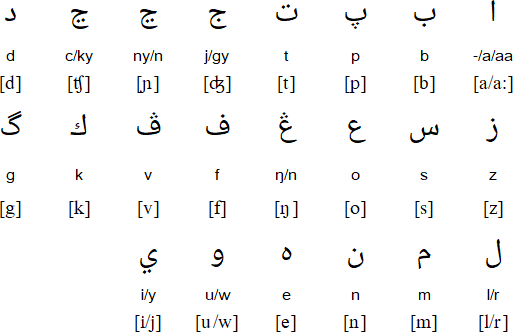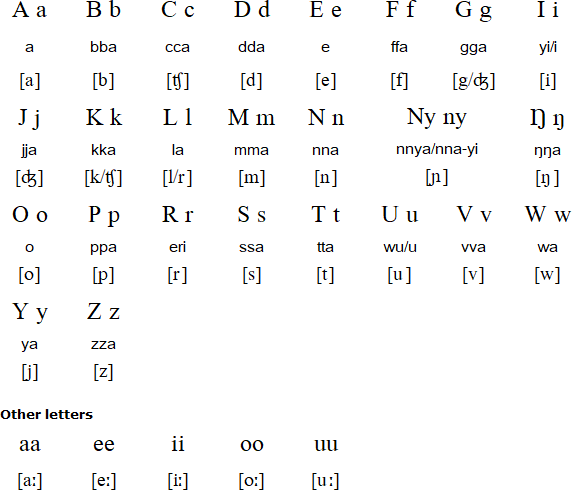Luganda, or Ganda, is a member of the Bantu branch of Niger-Congo languages. It is spoken by about 3 million Baganda people, who live mainly in the Buganda region in southern Uganda. Luganda is also widely used elsewhere in Uganda as a second language. The name Uganda is the Swahili version of Baganda.
Luganda was first written during the second half of the 19th century. The first Luganda grammar was published in 1882, and was soon followed by other publications, many of which were written by missionaries. A number of different Luganda spelling systems were developed. A standard orthography of Luganda (Empandiika y'Oluganda Entongol) was introduced in 1947 at an All-Baganda Conference.
Luganda is used as the language of instruction in some primary schools in the Buganda region. There are also regular radio broadcasts in Luganda.


Hear how to pronounce the Luganda alphabet:
Download alphabet charts for Luganda (Excel)
Abantu bazaalibwa nga balina eddembe n'obuyinza ebyenkanankana, batondebwa nga balina amagezi era nga basobola okwawula ekirungi n'ekibi bwebatyo, buli omu agwana okuyisa munne nga muganda we.

All human beings are born free and equal in dignity and rights. They are endowed with reason and conscience and should act towards one another in a spirit of brotherhood.
(Article 1 of the Universal Declaration of Human Rights)
Information about Luganda pronunciation compiled by Wolfram Siegel
Information about Luganda | Phrases | Numbers | Tower of Babel
Information about the Luganda language
http://en.wikipedia.org/wiki/Luganda_language
https://www.ethnologue.com/language/lug
A Primer on Speaking and Writing Luganda
http://www.buganda.com/luganda.htm
Luganda phrases
http://www.buganda.com/phrasebk.htm
https://quizlet.com/45128737/luganda-words-phrases-flash-cards/
http://files.peacecorps.gov/multimedia/audio/languagelessons/uganda/UG_Luganda_Language_Lessons.PDF
https://kabiza.com/luganda-101-simple-lugandan-phrases-for-travelers-to-uganda/
https://volunteertherealuganda.com/luganda-phrase-book/
Aka, Bafaw-Balong, Bangi, Basaa, Bemba, Bembe, Bena, Benga, Bhaca, Bube, Bukusu, Bulu, Central Teke, Chichewa, Chokwe, Chuwabu, Comorian, Dciriku, Digo, Duala, Eton, Ewondo, Fang, Ganda/Luganda, Gogo, Gusii, Gwere, Haya, Hehe, Herero, Ibinda, Ikizu, Ikoma, Jita, Kabwa, Kako, Kamba, Kiga, Kikuyu, Kimbundu, Kinyarwanda, Kirundi, Kisi, Kogo, Komo, Kongo, Konjo, Koti, Kukuya, Kunda, Kuria, Kwambi, Lambya, Lingala, Loma, Lozi, Luba-Katanga, Luchazi, Lunda, Luvale, Luyana, Makaa, Makonde, Makhuwa, Mandekan, Maore, Masaaba, Mbama, Mbere, Mbukushu, Mbunda, Mbuun, Mende, Mongo, Mpiemo, Mushungulu, Mwani, Nambya, Nande, Ngoni, Nkore, North Teke, Northern Ndebele (South Africa), Northern Ndebele (Zimbabwe), Northern Sotho, Nyamwezi, Nyakyusa, Nyemba, Nyole, Nyoro, Nyungwe, Nzadi, Oroko, OshiWambo, Pagibete, Punu, Ronga, Safwa, Sena, Sengele, Shona, Soga, Songe, Southern Ndebele, Southern Sotho, Sukuma, Swahili, Swati, Tanga, Tembo, Tonga, Tooro, Tshiluba, Tsonga, Tswa, Tswana, Tumbuka, Umbundu, Venda, Vili, Vwanji, Xhosa, Yakam, Yansi, Yao, Yasa, Yeyi, Zigula, Zinza, Zulu
Languages written with the Latin alphabet
Page last modified: 25.03.22
[top]
You can support this site by Buying Me A Coffee, and if you like what you see on this page, you can use the buttons below to share it with people you know.

If you like this site and find it useful, you can support it by making a donation via PayPal or Patreon, or by contributing in other ways. Omniglot is how I make my living.
Note: all links on this site to Amazon.com, Amazon.co.uk
and Amazon.fr
are affiliate links. This means I earn a commission if you click on any of them and buy something. So by clicking on these links you can help to support this site.
[top]